Adolescence Character & Citizenship Education
Character and Citizenship Education (CCE), including National Education (NE), and Social and Emotional Learning (SEL) are integral to the holistic development of our students, leading to positive life outcomes. CCE 2021 provides an integrated approach to addressing our students’ development of values, character, social-emotional well-being, and citizenship dispositions in a coherent and holistic way.
CCE 2021 aims to develop in our students:
a) Good character: Have a sound moral compass, a strong sense of right and wrong, think critically and ethically, be discerning in judgment, take responsibility for choices and actions, be caring towards others and strive for excellence.
b) Resilience and social-emotional well-being: Have a balanced sense of self, form healthy relationships, be resilient when faced with challenges, find meaning in life, and have a sense of gratitude and appreciation.
c) Active citizenship: Develop a strong national identity based on a sense of belonging to the nation, a sense of hope in themselves and the future, an awareness of the reality of Singapore’s vulnerabilities and constraints, and the will to act on improving the lives of others, and building a future for our nation.
d) Future readiness: Have a sense of purpose in life, develop the dispositions of adaptability and lifelong learning so as to be able to navigate education and career pathways purposefully and take on the challenges of the future, including the world of work.
Students will learn values through three overarching ideas, namely (Identity, Relationships and Choices) in six domains, starting with self and extending to the family, school, community, nation and the world. The diagram below shows the Core Values, the 3 Big Ideas and the Expanding Domains in the CCE syllabus.
CCE 2021 Curriculum Frame
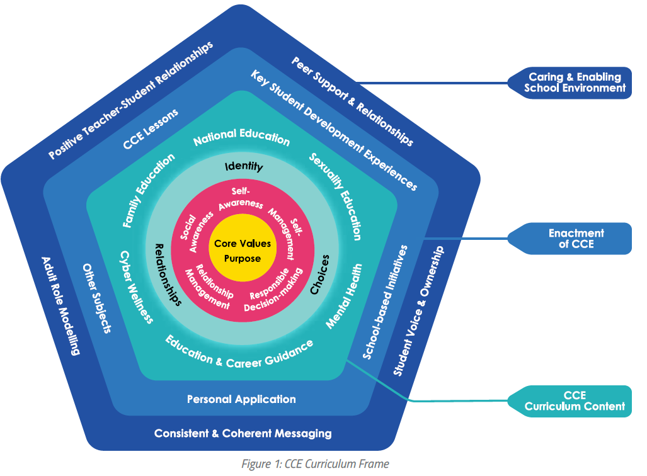
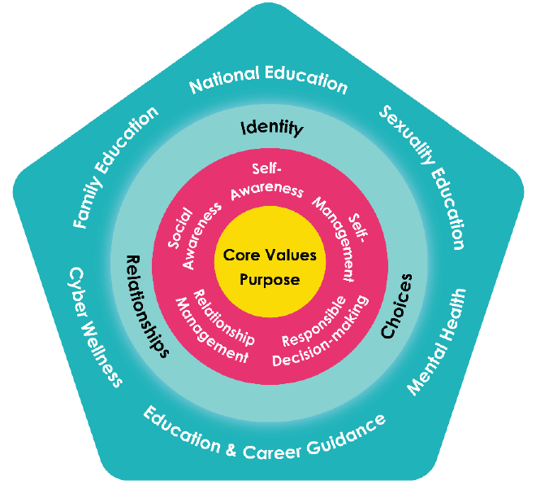
The curriculum content of CCE is based on the three big ideas of Identity, Relationships, and Choices, and comprises the teaching and learning of core values and social-emotional competencies with a focus on developing a sense of purpose in our students.
-
Core values and purpose
Our core values include respect, responsibility, resilience, integrity, care, and harmony, which are acknowledged as values that are at the foundation of our shared societal and national values. Recognising the potential in every child, the schooling environment creates learning opportunities that draw out and develop our students’ personal character strengths, e.g. adaptability, empathy, creativity, and curiosity; as well as nurture in them our shared societal and national values. Besides developing their personal character strengths, our students are encouraged to demonstrate care for others, consider others’ perspectives, and show sensitivity towards the thoughts and feelings of others.
In addition to values, there is a need to emphasise a sense of purpose. Finding a sense of purpose gives our life meaning. It is about discovering how one’s values, strengths, talents, and interests can be meaningfully applied so that one feels a sense of personal significance within one’s sphere of influence and beyond. Students may know and understand values, be able to articulate what they look like in practice, and have the competence to apply them; but they may not have the motivation to act on them when the situation calls for it. Integrating a sense of purpose into one’s identity is a vital part of the internalisation of values for character development and transformation2. With a sense of purpose, an individual is more likely to live out the core values that make up the foundation of his/her character, and meaningfully apply the social-emotional competencies learnt.
-
Social-emotional competencies
Social-emotional competencies enable us to examine and understand our own thoughts and emotions, develop a sense of responsibility and concern for others, and act for the good of self, others, and the society. When we apply these competencies, we live out our values and grow our character.
The competencies related to developing self-awareness allow us to understand our emotions, thoughts, values, personal goals, and mind-sets, which enable us to construct an understanding of who we are.
The competencies related to social awareness enable us to develop cognitive and emotional empathy, understand the perspectives of people with different backgrounds or cultures, and to become more sensitive to the social environment and the needs of others.
The competencies for self-management enable us to self-regulate our emotions, thoughts and behaviours, to achieve personal well-being, to demonstrate pro-social behaviours, and to choose to be our best selves.
The competencies for relationship management enable us to build and maintain positive relationships with others in accordance to social norms and culture. We also develop empathy through practising perspective-taking, and understanding the impact and consequences of our actions on others.
Responsible decision-making enables us to apply moral reasoning and sound values-based judgements in the choices we make.
These competencies can be taught, demonstrated, and applied through explicit instruction, planned authentic learning experiences, as well as teachable moments. For sustainable lifelong character development, these competencies must be taught, learnt, and applied within the broader context of values learning so that students understand the purpose and meaningfulness of acquiring these competencies.
The 3 big ideas: Conceptual core of CCE
(i) Identity
Identity, which is a complex and multi-faceted construct in developmental psychology, is at the core of the process of human psychosocial development. It is described by the fundamental question, “Who am I?”. This is a person’s subjective experience of who he or she is, largely influenced by his or her interaction with the social environment3. Identity is also about how a person sees himself/herself as belonging to a social group characterised by different features such as ethnicity, religion, profession, nationality, etc.
The question “Who am I?” prompts reflection on one’s self-identity and self-concept. The questions “Who do I want to be?” and “What does my best self-look like?” aim to empower individuals to shape their identity and self-concept positively with a sense of purpose and awareness of their personal significance in the world around them. One’s purpose needs to be not only meaningful to oneself, but also positively impacts the world beyond oneself.
(ii) Relationships
Humans are social beings. An individual’s social context, relationships, and social interactions play a significant role in shaping his/her identity. In educational settings, the nature and quality of relationships within the classroom and beyond have the potential to not only influence the students’ personal and social identity, but also their civic and national identity. Flanagan highlights that the school is a “mediating institution” of students’ experiences of the socio-political system of a nation.
Accordingly, the development of character strengths and potential of individuals must be balanced with considerations of the broader social, cultural, national, and global contexts within which the individual lives and flourishes. Furthermore, their understanding of their role as citizens is internalised through cultural transmission along with a social, collaborative process of meaning-making. This is especially so during the adolescent years. It is also important for all students to feel a sense of belonging and social trust, and an understanding of the common good, established through relationships and a sense of community.
The big idea of “Relationships” is guided by the question, “How do I relate to myself, others and the world around me?”. This question intends to prompt self-reflection and reflection on the individual’s interaction with the environment around him/her. This idea also signifies the importance of intentionally building a positive school culture, and establishing strong teacher-student relationships, student-student relationships, and peer support networks. This is so that students can experience a sense of belonging to the school community and develop resilience in the face of adversity. Students must also learn how to be inclusive and relate well to those who are different from them.
(iii) Choices
The big idea of “Choices” emphasises the complex environment that our students are growing up in, and the various types of decisions they will need to make. These decisions will determine - and be determined by - who they are and who they want to be. The questions, “How do I choose to be?”, “How do I choose to act?”, and “What kind of future do I want?”, emphasise agency or self-directedness, and personal responsibility in the choices one makes during the decision-making process both internally and externally.
Within the internal sphere, decisions are made in areas such as one’s value system, morality, personal excellence, and education and career goals. Externally, decisions on how to be and act occur within various contexts such as: the home, school, cyberspace, neighbourhood, common public spaces, the nation, and the world; relationships with family, friends, fellow citizens, others, and the environment; situations involving moral dilemmas, multiple perspectives, and contentious issues.
CCE Curriculum Content Areas
While the CCE Curriculum Content is premised on the three big ideas of Identity, Relationships and Choices, and anchored on the teaching of core values and social-emotional competencies, to help students find a sense of purpose, these fundamentals are taught and applied in the following Curriculum Content Areas.
(i) National Education (NE): NE, a significant aspect of CCE, comprises a wide range of school efforts that help students experience and explore their national identity as Singaporeans, understand the realities and challenges unique to our nation, and foster a sense of hope and belonging to Singapore. A strong sense of belonging, reality, and hope motivates our students to be active citizens. While they seek to achieve their personal life goals, they also see themselves as playing a contributory role in their immediate communities and in the nation. NE in CCE aims to be empowering and aspirational, allowing for individual sense-making, so as to nurture engaged citizens, who are socially aware, adept at critical thinking, and informed about local, regional, and global issues.
(ii) Sexuality Education (SEd): In this current age, better nutrition and improved health care has resulted in children reaching puberty and sexual maturity at a younger age. Furthermore, our young are also exposed to a wide range of influences from the media, including sexual mores that could endanger health and undermine the integrity of the family. Our students require guidance so that they can respond with discernment to the sexual messages in the media and other sources. SEd enables our students to understand the physiological, social, and emotional changes they experience as they mature, develop healthy and rewarding relationships including those with members of the opposite sex, and make wise, informed and responsible decisions on sexuality matters. While parents play the primary role in the sexuality education of their children, especially in the teaching and transmission of values about sex and sexuality, schools play an important supportive role.
(iii) Mental Health (MH): Mental health is about having a balance in various aspects of life, and learning values and social-emotional competencies to cope with life’s situations, relate to others and contribute to the community. A focus on MH in CCE at the secondary level helps students to strengthen their resilience and well-being; differentiate between stress, distress (overwhelming stress), and illness; enhance help-seeking efficacy; as well as destigmatise mental illness.
(iv) Education and Career Guidance (ECG): Young people in our schools today face a future that will be very different from that experienced by their parents and teachers. ECG is about equipping students with the necessary knowledge, skills, and values to make informed decisions at each key education stage for successful transition from school to further education or work, and hence to manage their career pathways and lifelong learning throughout their lives. Through ECG, students explore their strengths and abilities, examine their life’s purpose, and develop qualities of proactivity, adaptability, and resilience to prepare themselves for the 21st Century.
(v) Cyber Wellness (CW): Information and Communication Technologies (ICT) are becoming increasingly pervasive in our world. While creating instant connectivity and access to vast repositories of information, knowledge, and opinions, the open nature of the Internet can expose our students to undesirable content and influences. CW in CCE is important as it focuses on the well-being of our students as they navigate cyberspace, equipping them with the knowledge and skills to harness the power of ICT for positive purposes, maintain a positive presence in cyberspace, and be safe and responsible users of ICT.
(vi) Family Education (FE): FE is premised on the nation’s shared value of the family as the basic unit of society, and focuses on the importance of having stable family units with extended family support. Students learn about being responsible family members, and to be grateful for the role their families play in shaping who they are and who they become. They are encouraged to love and appreciate their families despite imperfections, and urged to reflect on the value of family relationships, and the importance of broadening their definition of success to include quality family life.
Establishing a Caring and Enabling School Environment
Establishing Positive Teacher-Student Relationships - the Key to Effective CCE Instruction
Positive interpersonal relationships between teachers and students contribute significantly to the students’ learning process. In positive Teacher-Student Relationships (TSR), students perceive they are respected, supported and valued by their teachers. When students experience positive TSR, they are more engaged in school and able to sustain their learning motivation. When teachers build positive relationships with their students, they feel a sense of security which allows them to engage more actively in interactions within the school environment, shaping their character, and social-emotional well-being and development.
In PRSS, time is set aside for home teachers to have Student-Teacher Conferences (STCs) in the morning. During STCs, HTs meet students one to one to get to know them better and to understand their concerns so that they are able to better support them.
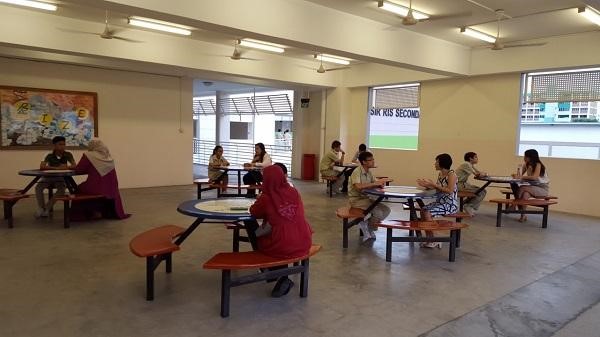
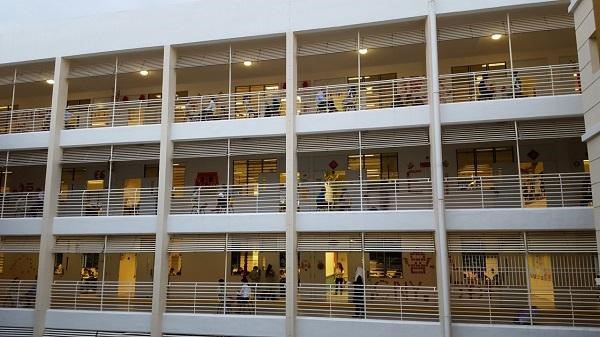
Peer Support and Relationships
Supportive peer relationships form a critical part of the network of positive relationships in school. Peers are a significant source of support for most students and especially so for adolescents as they are more likely to turn to their friends rather than adults for help. With Peer Support and Relationships (PSR), students participate in fostering strong bonds of friendships and a sense of belonging to the school community (peer bonding), provide practical help, and social-emotional support to one another (peer helping) and promote positive mindsets, pro-social behaviours both online and offline, well-being and role-model good character (peer influencing). Taken together, these efforts contribute to the building of a caring and supportive peer culture, by students for students.
Student Voice and Ownership
To establish an effective learning environment for CCE, it is critical to take into account student voices, and co-design learning approaches and activities that cater to their needs and interests. Creating space for students to be heard and encouraged to play an active role in what and how they learn, provides opportunities for them to develop agency or self-directedness, responsibility, and ownership of their learning. Student participation in the planning and implementation of some aspects of CCE, e.g. Values in Action (VIA) activities, Co-curricular activities (CCAs), outdoor activities, Cyber Wellness, peer-support initiatives and other relevant aspects, will create
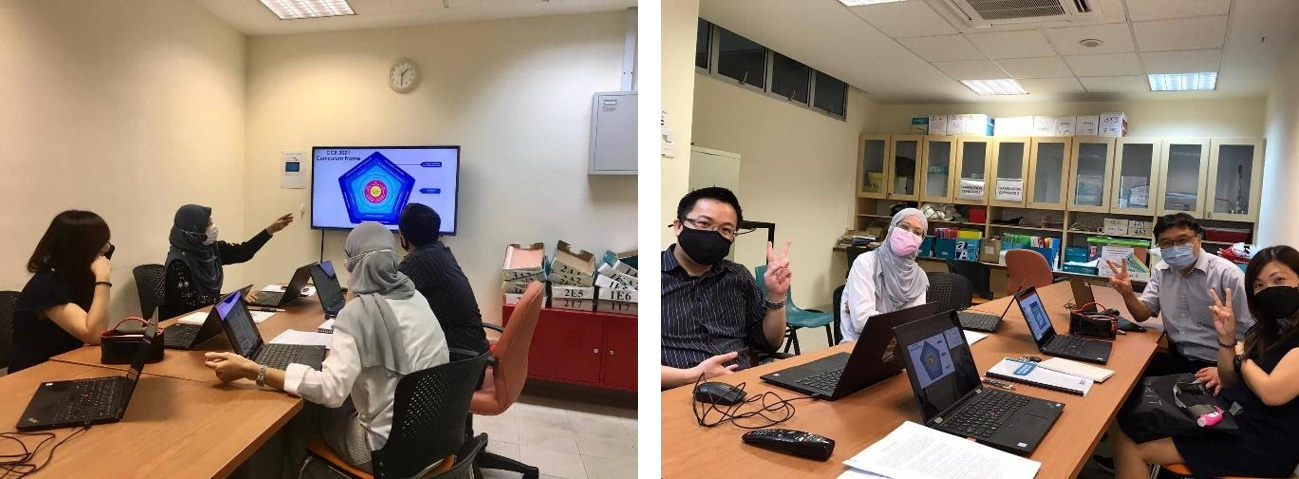
To increase student engagement during CCE lessons, the teachers seek to strengthen student voice through facilitating lessons well. To build up staff capacity in this area, the Specialised CCE teachers of each level conduct weekly training and discussions with the home teachers of each level, where they discuss about the lesson content, as well as the pedagogies that they using to enable effective learning and how to assess if students have learnt.
Adult Role-modeling
Adults in the school, especially school leaders, key personnel, teachers, and coaches have a powerful influence on students, who look to them for guidance, inspiration, wisdom, and support. Adults need to be aware of the positive or negative impact they can have on young minds, and consciously try to be good role models of the values, social-emotional competencies, and citizenship dispositions that we hope to see in students.
Consistent and Coherent Messaging
For schools to provide a conducive environment for positive dispositional development in our students, it is of critical importance that the messaging about values, character, social-emotional well-being, and citizenship is consistently and coherently demonstrated in the various experiences the student encounters throughout the school day. A common language used intentionally by all members of the school community will demonstrate coherence between intentions, goals, actions, decisions, habits, and behaviours. Systems and structures in the school also support and make explicit the messaging on the centrality of the development of students’ character and citizenship dispositions in the school environment.

